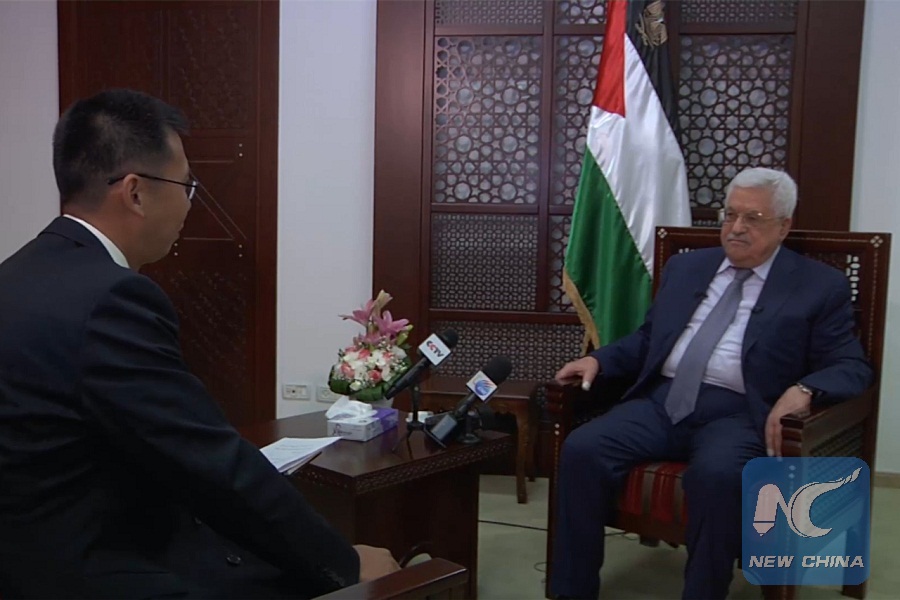Palestinian reconciliation must lead to single government with one law and one army, Abbas told Xinhua in an interview. (Xinhua Photo)
RAMALLAH, Oct. 24 (Xinhua) -- Palestinian President Mahmoud Abbas has stressed that the reconciliation between his Fatah Party and the Hamas movement must lead to a single authority with one law and one army.
Abbas made the remarks in a recent joint interview with the Chinese media representatives based in Palestine.
On October 12, Fatah and Hamas signed in Cairo, Egypt a reconciliation agreement that requires Hamas to hand over of its authority in the Gaza Strip to the consensus government headed by Prime Minister Rami Hamdallah.
"There must be one authority, one law and one gun, and there shouldn't be militias or others ... we want to be like other countries in the world," Abbas said.
Any state who wants to provide aid to the Palestinians should go through the Palestinian National Authority (PNA) only, Abbas insisted, adding that the Palestinian leadership "doesn't want to turn the Gaza Strip into the militia model, because it is not successful."
Over the past decade, the cause of seeking an independent Palestinian state has been set back by an internal division between Hamas, which has ruled the Gaza Strip since 2007, and Fatah, which has been ruling the West Bank. Hamas has been receiving aid from countries like Qatar, Turkey and Iran.
The Palestinians do not to want to have "anyone intervening in our internal affairs because we don't interfere in others' affairs," Abbas said.
On the Egypt-brokered reconciliation deal, Abbas said its implementation is "moving forward" in order to end the decade-long internal division has hurt the Palestinian cause so much.
The agreement is "very important" as it includes all the details related to the reconciliation, and "we are going forward towards the implementation," the Palestinian leader said.
"The Palestinian position is clear and solid that there will be no Palestinian state in Gaza only and there will be no Palestinian state without Gaza," Abbas added.
Before signing the agreement in Cairo, Hamdallah and some Palestinian cabinet ministers and security officials visited the Gaza Strip and took over the ministries in the coastal enclave that has suffered from decade-long of blockade by the PNA and Israel.
"Reconciliation is going ahead and we carry out steps on daily bases to implement it, where ministers from the West Bank go now to Gaza to function there in order to reach at the end to one state with one system," Abbas noted.
The Palestinian leader pledged to do his best to accomplish the goals of the reconciliation, which he said is fully supported by major countries such as China and Russia, as well as European and Arab countries.
"All want to see reconciliation is accomplished and we will do our best to accomplish it," he vowed.
However, Abbas called for patience, citing that the process of implementing the reconciliation deal "needs time and patience and we don't want to hurry up."
Under the deal, the consensus government led by Hamdallah, which was formed in June 2014, will gradually start ruling the Gaza Strip, including taking over the crossing points, ministries and establishments there. It is expected to fully take over the rule in the enclave on December 1.


